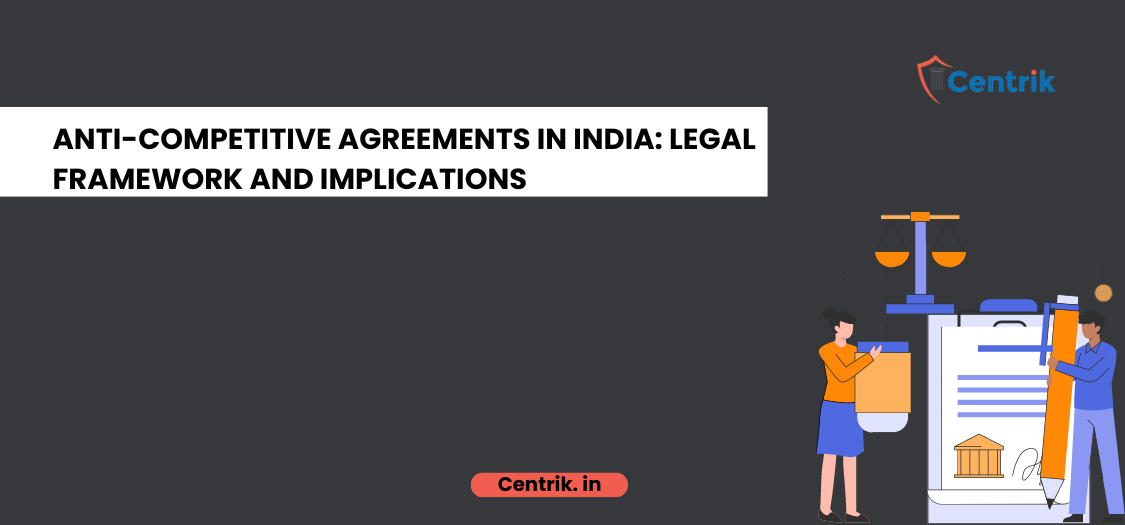Anti-competitive agreements are a significant area of concern under Indian competition law, governed by the Competition Act, of 2002. These agreements, which have the potential to harm the competitive process and consumer welfare, are strictly regulated by the Competition Commission of India (CCI). The legal framework surrounding anti-competitive agreements aims to maintain fair competition in the market, prevent monopolistic practices, and protect consumer interests.

Legal Framework under the Competition Act, 2002
Section 3 of the Competition Act, 2002, serves as the primary provision regulating anti-competitive agreements. It broadly categorizes these agreements into two types: horizontal agreements (agreements between competitors) and vertical agreements (agreements between enterprises at different levels of the supply chain).
1. Horizontal Agreements (Section 3(3)):
-
- Horizontal agreements are those made between entities operating at the same level in the market, typically competitors. These agreements are presumed to have an appreciable adverse effect on competition (AAEC) and are per se illegal.
- Cartels: A common example of a horizontal agreement is a cartel, where competitors agree to fix prices, limit production, allocate markets, or engage in bid-rigging. Such conduct is strictly prohibited as it directly harms consumers by reducing competition, leading to higher prices and restricted choices.
- Price Fixing: An agreement among competitors to fix prices, whether directly or indirectly, is illegal. This includes setting a standard price or coordinating prices to avoid competition.
- Market Allocation: Competitors dividing markets by geography, customer type, or product category to avoid competing against each other is also prohibited.
2. Vertical Agreements (Section 3(4)):
-
- Vertical agreements are made between enterprises at different production or supply chain levels, such as manufacturers and distributors. These agreements are not per se illegal but are subject to a rule of reason analysis to determine if they cause an AAEC.
- Exclusive Supply Agreements: Such agreements restrict a buyer from purchasing goods or services from any supplier other than the one specified in the contract. While these can be pro-competitive in some cases, they may be anti-competitive if they foreclose market access to competitors.
- Resale Price Maintenance (RPM): This involves setting a minimum resale price by an upstream seller, preventing downstream buyers from selling below that price. RPM can restrict price competition among retailers, harming consumers by keeping prices artificially high.
- Tying and Bundling: Forcing consumers to buy a product as a condition for purchasing another is considered anti-competitive if it limits consumer choice or harms competition in the tied product’s market.
Exemptions and Leniency
While Section 3 prohibits anti-competitive agreements, certain exemptions exist. For instance, agreements aimed at improving efficiency, promoting technical or scientific progress, or contributing to consumer welfare may be allowed if they do not significantly harm competition.
The CCI also has a leniency program that encourages entities involved in cartels to come forward with information in exchange for reduced penalties. This has been instrumental in uncovering and penalizing cartel activities in India.
Enforcement and Penalties
The CCI plays a crucial role in enforcing the provisions of the Competition Act. It has the authority to investigate suspected anti-competitive agreements, often initiating probes based on complaints, suo motu action, or leniency applications. Upon finding a violation, the CCI can impose significant penalties, including fines up to 10% of the turnover of each party involved or three times the profit made from the agreement, whichever is higher.
Conclusion
Anti-competitive agreements, particularly those involving cartels and price-fixing, pose a severe threat to the competitive landscape and consumer welfare in India. The Competition Act, of 2002, provides a robust framework to curb such practices, ensuring markets remain competitive and fair. Compliance with these regulations is essential for businesses operating in India to avoid hefty penalties and contribute to a healthy market environment.




 join For Updates
join For Updates